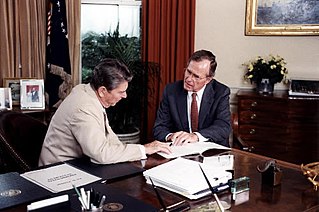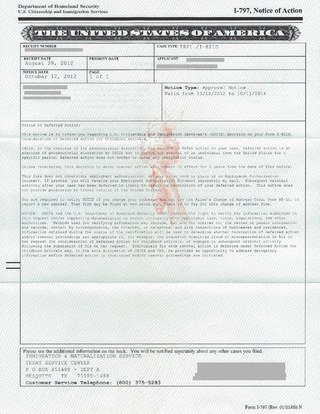Related Research Articles
Reforming the immigration policy of the United States is a subject of political discourse and contention. Immigration has played an essential part in American history, as except for the Native Americans, everyone in the United States is descended from people who migrated to the United States. Some claim that the United States maintains the world's most liberal immigration policy.

The Development, Relief, and Education for Alien Minors Act, known as the DREAM Act, is a United States legislative proposal that would grant temporary conditional residency, with the right to work, for undocumented immigrants who entered the United States as minors—and, if they later satisfy further qualifications, they would attain permanent residency.

Parole, in the immigration laws of the United States, generally refers to official permission to enter and remain temporarily in the United States, under the supervision of the U.S. Department of Homeland Security (DHS), without formal admission, and while remaining an applicant for admission.

A signing statement is a written pronouncement issued by the President of the United States upon the signing of a bill into law. They are usually printed in the Federal Register's Compilation of Presidential Documents and the United States Code Congressional and Administrative News (USCCAN). The statements offer the president's view of the law or laws created by the bill.

John Deacon Bates is a senior United States district judge of the United States District Court for the District of Columbia. He was appointed by President George W. Bush in December 2001, and has adjudicated several cases directly affecting the office of the President. Bates served as Director of the Administrative Office of the United States Courts, from July 1, 2013 to January 5, 2015, after which he returned to full-time service as a senior judge.
Zeituni Onyango was the half-aunt of United States President Barack Obama; she was born into the Luo tribe in Kenya. Born during the British rule of the Protectorate of Kenya, Onyango was the half-sister of Barack Obama Sr., father to the president. The younger Obama refers to her as "Aunti Zeituni" in his 1995 memoir, Dreams from My Father. In 2002 she applied for political asylum in the United States but was denied. She became notable when her case was leaked in the final days of the 2008 U.S. presidential campaign in which Barack Obama was the Democratic candidate, attracting international media attention.

Barack Obama's tenure as the 44th president of the United States began with his first inauguration on January 20, 2009, and ended on January 20, 2017. Obama, a Democrat from Illinois, took office following his victory over Republican nominee John McCain in the 2008 presidential election. Four years later, in the 2012 presidential election, he defeated Republican nominee Mitt Romney, to win re-election. Obama is the first African American president, the first multiracial president, the first non-white president, and the first president born in Hawaii. Obama was succeeded by Republican Donald Trump, who won the 2016 presidential election. Historians and political scientists rank him among the upper tier in historical rankings of American presidents.

Deferred Action for Childhood Arrivals (DACA) is a United States immigration policy that allows some individuals who, on June 15, 2012, were physically present in the United States with no lawful immigration status after having entered the country as children at least five years earlier, to receive a renewable two-year period of deferred action from deportation and to be eligible for an employment authorization document.

During Barack Obama's tenure as President of the United States from 2009 to 2017, certain Republican members of Congress, as well as Democratic congressman Dennis Kucinich, stated that Obama had engaged in impeachable activity and that he might face attempts to remove him from office. Rationales offered for possible impeachment ranged from Obama allowing people to use bathrooms based on their gender identity, to the 2012 Benghazi attack, to Obama's enforcement of immigration laws, and false claims that he was born outside the United States.
Undocumented youth in the United States are young people living in the United States without U.S. citizenship or other legal immigration status. An estimated 1.1 million undocumented minors resided in the U.S. as of 2010, making up 16% of the undocumented population of 11 million. Undocumented students face unique legal uncertainties and limitations within the United States educational system. They are sometimes called the 1.5 generation, as they have spent a majority of their lives in the United States.

Deportation and removal from the United States occurs when the U.S. government orders a person to leave the country. In fiscal year 2014, Immigration and Customs Enforcement conducted 315,943 removals. Criteria for deportations are set out in 8 U.S.C. § 1227.
Deferred Action for Parents of Americans and Lawful Permanent Residents (DAPA), sometimes called Deferred Action for Parental Accountability, was a planned United States immigration policy to grant deferred action status to certain undocumented immigrants who have lived in the United States since 2010 and have children who are either American citizens or lawful permanent residents. It was prevented from going into effect. Deferred action would not be legal status but would come with a three-year renewable employment authorization document and exemption from deportation. DAPA was a presidential executive action, not a law passed by Congress.
United States v. Texas, 579 U.S. ___ (2016), is a United States Supreme Court case regarding the constitutionality of the Deferred Action for Parents of Americans (DAPA) program.
The Priority Enforcement Program is a program by U.S. Immigration and Customs Enforcement (ICE), the agency responsible for immigration enforcement in the interior of the United States, under the U.S. Department of Homeland Security (DHS). PEP was an ICE program that worked with state and local law enforcement to identify illegal aliens who come in contact with state or local law enforcement, and remove those who are removable. PEP was announced by DHS Secretary Jeh Johnson in a November 20, 2014 memo as a replacement for Secure Communities (S-COMM). It builds on an updated list of immigration enforcement priorities released in another memo by Johnson issued on the same day.
Family Fairness was a program run by the Immigration and Naturalization Service in the United States from late 1987 to late 1990 that granted deferred action to spouses and children of immigrants who were granted amnesty in 1986. The initial version was introduced in late 1987 by then INS Commissioner Alan C. Nelson, working under then Attorney General Edwin Meese and then President Ronald Reagan. An expansion of the program was introduced in early 1990 by INS Commissioner Gene McNary working under then Attorney General Dick Thornburgh and then United States President George H. W. Bush. The program was created through executive action, in order to meet the problem of "split-eligibility" families created by the Immigration Reform and Control Act of 1986, pending legislation that would address the issue. The Immigration Act of 1990 replaced it with a legislatively sanctioned Family Unity Program, that continues to be in force today.

Department of Homeland Security v. Regents of the University of California, 591 U.S. 1 (2020), was a United States Supreme Court case in which the Court held by a 5–4 vote that a 2017 U.S. Department of Homeland Security (DHS) order to rescind the Deferred Action for Childhood Arrivals (DACA) immigration program was "arbitrary and capricious" under the Administrative Procedure Act (APA) and reversed the order.
Wolf v. Vidal, 591 U.S. ___ (2020), was a case that was filed to challenge the Trump Administration's rescission of Deferred Action for Childhood Arrivals (DACA). Plaintiffs in the case are DACA recipients who argue that the rescission decision is unlawful under the Administrative Procedure Act and the Fifth Amendment. On February 13, 2018, Judge Garaufis in the Eastern District of New York addressed the question of whether the government offered a legally adequate reason for ending the DACA program. The court found that Defendants did not provide a legally adequate reason for ending the DACA program and that the decision to end DACA was arbitrary and capricious. Defendants have appealed the decision to the Second Circuit Court of Appeals.
Federal policy oversees and regulates immigration to the United States and citizenship of the United States. The United States Congress has authority over immigration policy in the United States, and it delegates enforcement to the Department of Homeland Security. Historically, the United States went through a period of loose immigration policy in the early-19th century followed by a period of strict immigration policy in the late-19th and early-20th centuries. Policy areas related to the immigration process include visa policy, asylum policy, and naturalization policy. Policy areas related to illegal immigration include deferral policy and removal policy.

The U.S. Citizenship Act of 2021 was a legislative bill that was proposed by President Joe Biden on his first day in office. It was formally introduced in the House by Representative Linda Sánchez. It died with the ending of the 117th Congress.
Keeping Families Together (KFT) is a United States immigration policy for certain noncitizen spouses and noncitizen stepchildren of American citizens to request parole in place. It was announced by U.S. President Joe Biden through executive order on 18 June 2024 and implemented on 19 August 2024.
References
- ↑ Wadhia, Shoba S. (2010). "The role of prosecutorial discretion in immigration law". Connecticut Public Interest Law Journal. 9: 243–300.
- ↑ Lind, Dara (20 November 2014). "Did George H.W. Bush really pave the way for Obama on immigration?". Vox . Vox Media . Retrieved 24 November 2014.
- ↑ "Summary of President's Immigration Accountability Executive Action" (PDF). National Immigration Forum. 24 November 2014. Retrieved 24 November 2014.